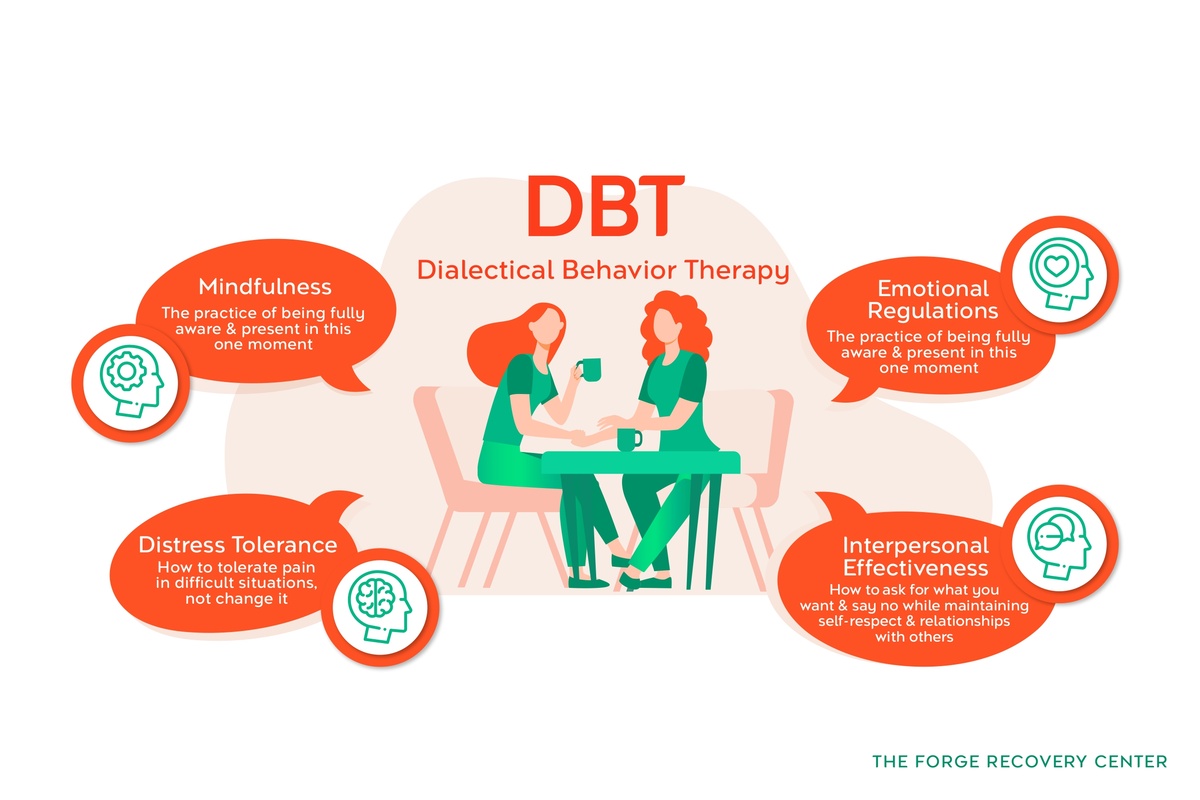DBT Therapy: Treating Mental Health & Substance Use Disorders


DBT, or dialectical behavior therapy, is a powerful treatment method for conditions such as borderline personality disorder (BPD), mood disorders, and self-harm tendencies. It uses a unique blend of cognitive behavioral techniques and mindfulness practices to promote emotional regulation and improve interpersonal relationships. Explore the applications and efficacy of DBT therapy, and call The Forge Recovery Center today if you require professional treatment and support.
What Is DBT Therapy?
DBT therapy, or dialectical behavior therapy, is a type of cognitive behavioral therapy that was originally developed to treat individuals with borderline personality disorder (BPD). However, it has since been found to be effective in treating other mental health conditions such as depression, anxiety, and eating disorders. DBT therapy focuses on helping individuals build skills in four key areas:
Mindfulness
Distress tolerance
Emotion regulation
Interpersonal effectiveness
By learning these skills, individuals can better manage their emotions, improve their relationships, and cope with difficult situations in a healthier way. DBT therapy often involves a combination of individual therapy, group skills training, phone coaching, and therapist consultation teams to provide comprehensive support for clients.
CBT Vs. DBT Therapy
When it comes to cognitive behavioral therapy (CBT) and DBT therapy, they differ in their approaches and techniques. DBT focuses more on acceptance and mindfulness compared to CBT's emphasis on changing negative thought patterns. The unique aspect of DBT therapy lies in its incorporation of skills training for managing intense emotions.
In DBT therapy, you receive guidance on regulating emotions, handling stress, and improving relationships through practical strategies. Unlike CBT, which primarily targets cognitive distortions, DBT addresses emotional dysregulation by teaching coping mechanisms for overwhelming feelings. This tailored approach makes DBT therapy particularly effective for individuals struggling with intense emotional experiences.
One key distinction between CBT and DBT is the focus on acceptance in the latter. While CBT aims to challenge and change negative thoughts, DBT therapy encourages you to accept your current emotions without judgment. By acknowledging and understanding your feelings, you can develop healthier ways to cope with distressing situations. In essence, DBT therapy equips you with the tools to navigate intense emotions more effectively.

What Conditions Does DBT Therapy Treat?
DBT is typically used to treat anxiety disorders, mood disorders, eating disorders, and cases of substance abuse and addiction. Here’s a deeper look at the types of conditions DBT is applicable to:
Anxiety Disorders
DBT therapy can effectively help individuals with anxiety disorders by teaching them skills to manage overwhelming emotions. Emotion regulation in DBT involves identifying and labeling emotions to develop healthier coping mechanisms. Specific techniques like mindfulness meditation and grounding exercises are utilized in DBT for treating anxiety.
Mood Disorders
DBT therapy addresses mood disorders such as bipolar disorder by focusing on building emotion regulation skills. It helps you regulate intense emotions by increasing awareness of triggers and responses. Mindfulness plays a crucial role in managing mood disorders through DBT, enabling you to stay present and cope with distressing thoughts effectively.
Substance Abuse & Addiction
DBT therapy aids individuals struggling with substance abuse by teaching practical strategies for handling distressing situations without turning to substances. Distress tolerance skills in DBT help you navigate cravings and urges without succumbing to them. Incorporating mindfulness practices in DBT therapy enhances self-awareness, reducing impulsive behaviors related to substance abuse.
Eating Disorders
In treating eating disorders, DBT therapy focuses on emotional regulation to address issues like binge eating disorder and bulimia. It emphasizes recognizing triggers that lead to unhealthy eating behaviors and developing alternative responses. Mindfulness techniques in DBT assist you in cultivating a non-judgmental awareness of your thoughts and feelings around food consumption.

How DBT Works
DBT includes a mix of therapy sessions and skills training to manage emotions effectively and uses certain techniques (i.e. distress tolerance training) to help you cope with strong emotional responses in a healthy way. Here’s a more in-depth summary of how DBT works:
DBT Therapy Techniques
DBT therapy incorporates various techniques to help you manage emotions and improve relationships. Mindfulness is a key practice in DBT, focusing on staying present and aware of your thoughts and feelings. Distress tolerance skills teach you how to cope with intense emotions without making impulsive decisions.
Dialectics, a core concept in DBT, emphasizes finding a balance between acceptance and change. In therapy, this means acknowledging your current state while working towards personal growth. Validation plays a crucial role in DBT techniques by recognizing and affirming your experiences, fostering a sense of understanding and support.
Therapy Sessions
DBT therapy sessions typically follow a structured format, combining individual therapy with group sessions. Your therapist will guide discussions on coping strategies, emotional regulation, and interpersonal skills. These sessions often last around 60-90 minutes and occur weekly to ensure consistent progress.
Collaboration is at the heart of DBT therapy sessions, with therapists encouraging open communication and active participation from individuals. Together, you and your therapist set goals, track progress, and address challenges in a supportive environment focused on personal growth.
Skills Training
Skills training is an essential component of DBT therapy, offering practical tools for managing emotions effectively. The four modules of skills training include mindfulness, which enhances self-awareness; interpersonal effectiveness, focusing on communication and boundaries; emotion regulation; teaching strategies to navigate intense feelings; and distress tolerance, providing techniques for handling crises calmly.
These skills are not just theoretical concepts but are designed for real-life application. For example, mindfulness practices can help you stay grounded during moments of stress or anxiety. Interpersonal effectiveness skills enable you to communicate assertively while maintaining healthy relationships.
Find Hope at The Forge Recovery Center
Our admissions coordinators are standing by 24/7 to answer your questions, provide guidance, and schedule an initial assessment. Let us help you determine if our programs are the right fit to meet your needs.

What to Expect
If you or a loved one are considering starting DBT therapy, it’s important to know what’s in store. Here’s a glimpse at what’s ahead, from therapy sessions and homework assignments to group therapy expectations:
Setting Goals
Setting specific and achievable goals in DBT therapy is crucial for your progress. These goals act as milestones to measure your development and success. By setting clear objectives, you can track your progress effectively throughout the therapy process. The collaborative nature of goal-setting in DBT therapy involves both you and your therapist working together to establish meaningful and realistic targets that align with your needs and aspirations.
Participating in Sessions
To make the most of your DBT therapy sessions, it's important to actively engage by participating fully. Open communication and honesty are key components of successful therapy sessions, allowing you to express your thoughts, feelings, and concerns openly. By practicing the skills learned during sessions outside of therapy, you can reinforce their effectiveness in real-life situations, leading to lasting behavioral changes.
Homework Assignments
Homework assignments in DBT therapy serve a specific purpose in enhancing your learning experience. These assignments are designed to reinforce the skills taught during therapy sessions by providing practical exercises for you to apply what you've learned in different scenarios. Common homework assignments may include keeping a diary of emotions and behaviors, practicing mindfulness exercises daily, or engaging in interpersonal interactions using newly acquired skills.
Group Therapy Dynamics
In DBT group therapy, you will experience a supportive environment that fosters interpersonal growth through peer interaction and feedback. Group dynamics play a significant role in enhancing your social skills, empathy, and understanding of others' perspectives. Engaging with peers facing similar challenges can provide a sense of community and shared experiences, creating a supportive network that encourages personal development.

Post-DBT Therapy
Once therapy has concluded, it’s important to keep practicing the coping skills learned during treatment to maintain your progress. This can be accomplished by recognizing setbacks as they occur, and ensuring that you have a solid support system to keep you on a straight path:
Maintaining Progress
After completing DBT therapy, you must continue practicing the skills learned to maintain progress. Consistent application of DBT techniques in daily life is crucial. Set reminders to practice mindfulness and emotion regulation regularly.
Recognizing setbacks is essential in maintaining progress post-therapy. You may encounter challenges that test your newly acquired skills. Stay mindful of warning signs like increased stress or emotional dysregulation. Address setbacks promptly with the tools learned in therapy.
Support Networks
Support networks play a vital role in DBT therapy and recovery. Surrounding yourself with understanding individuals can aid in sustaining progress. Engage with friends, family, or support groups who encourage your growth and well-being.
Building a strong support system during and after DBT therapy is key to long-term success. Seek out individuals who validate your experiences and provide constructive feedback. Connect with peers who have similar experiences for shared understanding and encouragement.
DBT Therapy Effectiveness
Research Studies
Research studies have consistently shown positive outcomes from DBT therapy. Studies indicate effectiveness in treating borderline personality disorder, self-harm behaviors, and substance abuse, with recent research expanding the application of DBT to other mental health conditions accordingly.
Studies support the use of DBT therapy for a wide range of mental health issues. Research findings demonstrate its efficacy in reducing symptoms of depression, anxiety, and PTSD. Ongoing studies are exploring its benefits for eating disorders and bipolar disorder.
Recent advancements in DBT therapy focus on enhancing its effectiveness across diverse populations. Ongoing research aims to tailor treatments for specific demographics and cultural backgrounds, as the field continues to evolve with innovative approaches to improve patient outcomes.
Statistics
Statistical data highlights the success rates of DBT therapy, showing significant improvements in patients' well-being. Success rates vary across different mental health conditions but generally show positive results. The acceptance and popularity of DBT therapy are on the rise due to its proven efficacy.
Comparing the effectiveness of DBT therapy across various mental health conditions reveals promising outcomes. For example, studies show high success rates in reducing self-harm behaviors among individuals with borderline personality disorder. Success rates may vary based on individual differences and treatment adherence.
The growing popularity of DBT therapy is evident in the increasing number of practitioners offering these services worldwide. Statistical trends indicate a rising demand for DBT therapy as more individuals seek evidence-based treatments for mental health challenges.
Are You Struggling with Mental Health or Addiction?
We Can Help. Call Us Now!
CALL: 877-839-1772
Closing Thoughts
Now that you have a comprehensive understanding of DBT therapy, its benefits, and how it can help manage various conditions, you are equipped to make an informed decision. Remember that seeking support is a sign of strength, and taking the step towards improving your mental well-being is a powerful choice. Your journey towards healing and growth may have challenges, but with the right tools and guidance from DBT therapy, you can navigate them successfully. Embrace the process, stay committed to your well-being, and trust in the positive changes it can bring to your life.
If you or someone you know could benefit from DBT therapy, take that crucial step today. Your mental health matters, and seeking help is the first step towards a brighter tomorrow. Reach out to a qualified professional and embark on a transformative journey towards emotional wellness and resilience.
Are You Ready to Start DBT Therapy?
DBT therapy can arm you with the skills to properly manage emotional instability, navigate the twists and turns of mood disorders, and curb self-harm tendencies. If you or someone you care about are grappling with these challenges and need a supportive partner in your path to recovery, The Forge Recovery Center is here to guide you. Our team of mental health professionals and treatment specialists are well-versed in DBT therapy and strategies and will provide a customized therapeutic journey designed around your specific needs and objectives.
Contact us today to learn more about our DBT therapy procedures and start your healing journey.



